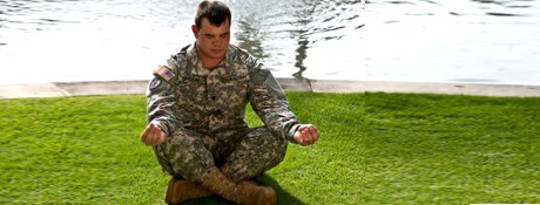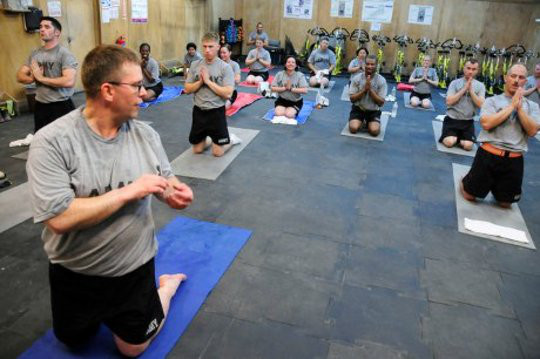
It’s no secret that yoga can aid mental well-being. What is more, it can help soldiers suffering from post-traumatic stress disorder, according to new research.
Some of the most damaging consequences of seeing combat can happen in the mind. Of the 2.3m American veterans who returned from wars in Iraq and Afghanistan, up to 20% go on to suffer from post-traumatic stress disorder (PTSD) at some point. In a report published by the US Department of Veterans Affairs at least 22 American veterans take their lives every day.
The effects of PTSD can include intrusive memories, heightened anxiety and personality changes. Individuals can also experience hyper-arousal, where they are easily startled, feel “jumpy” and constantly on guard. Standard current treatment for PTSD generally involves prescriptions for antidepressants and psychotherapy, with mixed results.
Yoga Can Be Used To Bring Better Mental Balance
In a new study published in the Journal of Traumatic Stress, researchers say that yoga can be used to bring better mental balance.
Get The Latest By Email
Yoga has previously been shown as valuable in reducing the stress of university students, and depression, anxiety, alcoholism and PTSD in tsunami survivors, as well as helping cancer patients. The charity Yoga for America runs programmes for serving soldiers and war veterans.
Agnieszka Golec de Zavala, senior lecturer in psychology at Goldsmiths, University of London, said the benefits of yoga included moving people away from negative thoughts.
The beneficial effects are due to the increased ability to focus on breathing that, firstly, focuses a person on a present moment and breaks rumination on negative traumatic thoughts, and secondly, increases ability of ‘intraception’ – observing and understanding internal states and the ability to control them, or understanding them as temporal and passing.
But the new study is the first of its kind to provide scientific support for the benefits of yoga’s breathing techniques for PTSD patients in a randomised and controlled (though small) long-term study which monitored effects of yoga over the course of the year.
Breathing-Based Meditation Balances the Autonomic Nervous System
The study focused on the effects of sudarshan kriya yoga, a practice of breathing-based meditation which has a balancing effect on the autonomic nervous system.

Camp Adder soldiers hit the mats in Iraq. The National Guard/flickr
Twenty-one male veterans who had served in Iraq or Afghanistan, diagnosed with PTSD, were included in the study: 11 undertook a seven-day programme involving daily three-hour sessions of sudarshan kriya, including meditation, stretching and group discussion, while ten others didn’t take part were used as a control group.
The soldiers' PTSD symptoms were assessed one week before the beginning of the programme and then a week, a month and a year after its completion. Seven of the 11 involved in the active group continued practising yoga after completing the programme.
Impact of Traumatic Memories Reduced
The study found that the group who had done yoga demonstrated fewer or less intense PTSD symptoms in comparison. Those who took part in the yoga sessions showed lower anxiety and lower respiration rates. They performed better in tests measuring eye-blink and breathing frequency in response to stimuli such as noise bursts, which are used to measure hyper-arousal and how an well individuals are regulating emotions. The researchers also found that the sessions helped with intrusive memories: patients reported re-experiencing trauma during the exercises, but felt that the impact of the memories was reduced.
“The authors describe their results as ‘promising’ and I think this is what they are,” said Golec de Zavala, who is also a qualified yoga teacher. She emphasised, however, that like many other studies examining the benefits of yoga, this study is limited by the small study groups on which their results are based. “More studies are needed and such studies would be highly valuable regarding low costs of this form of treatment and the initial evidence suggesting its effectiveness,” she added.
Richard Davidson, professor of psychology and psychiatry at the UW-Madison and one of the authors of the study, said he hoped that that the study could be extended to more participants with wider demographic representation. If still promising, then doctors could prescribe yoga as treatment for patients suffering from post-traumatic stress disorder in the future.
A clinician could use a ‘tool box’ of psychological assessments to determine the cognitive and emotional style of the patient, and thereby determine a treatment that would be most effective for that individual. Right now, a large fraction of individuals who are given any one type of therapy are not improving on that therapy. The only way we can improve that is if we determine which kinds of people will benefit most from different types of treatments.
And one of those tools could be yoga.
This article was originally published on The Conversation.
Read the original article.
 About the Author
About the Author
Flora Lisica is Assistant Section Editor at The Conversation.
The Conversation is a collaboration between editors and academics to provide informed news analysis and commentary.
Recommended book:
Overcoming Trauma through Yoga: Reclaiming Your Body
by David Emerson and Elizabeth Hopper, PhD.
 The trauma-sensitive yoga described in this book moves beyond traditional talk therapies that focus on the mind, by bringing the body actively into the healing process. This allows trauma survivors to cultivate a more positive relationship to their body through gentle breath, mindfulness, and movement practices. Overcoming Trauma through Yoga is a book for survivors, clinicians, and yoga instructors who are interested in mind/body healing. It introduces trauma-sensitive yoga, a modified approach to yoga developed in collaboration between yoga teachers and clinicians at the Trauma Center at Justice Resource Institute, led by yoga teacher David Emerson, along with medical doctor Bessel van der Kolk.
The trauma-sensitive yoga described in this book moves beyond traditional talk therapies that focus on the mind, by bringing the body actively into the healing process. This allows trauma survivors to cultivate a more positive relationship to their body through gentle breath, mindfulness, and movement practices. Overcoming Trauma through Yoga is a book for survivors, clinicians, and yoga instructors who are interested in mind/body healing. It introduces trauma-sensitive yoga, a modified approach to yoga developed in collaboration between yoga teachers and clinicians at the Trauma Center at Justice Resource Institute, led by yoga teacher David Emerson, along with medical doctor Bessel van der Kolk.
Click here for more info and/or to order this book on Amazon.







